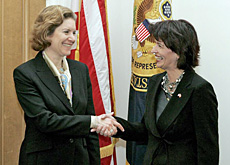
Leuthard networks in Washington

Economics Minister Doris Leuthard says she has found points of agreement in talks with senior United States government representatives.
Leuthard’s first official visit to Washington focused on stalled World Trade Organisation (WTO) negotiations and on bilateral relations in general.
“I am very happy with the results of the meetings,” she told swissinfo.
Leuthard said the Bush administration had given the go-ahead for Swiss investors to participate in the federal reconstruction plan for the area surrounding New Orleans that was devastated by Hurricane Katrina in August 2005.
During her visit she held discussions with US trade representative Susan Schwab, as well as the secretary of agriculture, Mike Johanns, and the deputy ministers for commerce and for employment.
But she did not meet with her direct counterpart, Treasury Secretary Hank Paulson.
In Congress she held talks with Collin Peterson, the incoming chairman of the House Committee on Agriculture, and Mike Castellano, leader of the new Democrat majority in the Senate.
Pessimistic
The main focus of the visit was the Doha Round of trade liberalisation negotiations, which collapsed in July after the breakdown of talks in Geneva between the six leading members of the WTO.
On Sunday Pascal Lamy, the WTO’s director-general, said he was pessimistic about reaching an agreement before the spring on ways to lower trade barriers around the world.
The end of March is seen as a cut-off date for completing the final draft text of the new trade promotion authority (TPA). Formerly known as fast-track authority, this provides the US trade representative with an authority to negotiate important trade agreements with other countries.
Any trade agreements involving non-tariff matters could not enter into force for Washington unless the US president complied with specific requirements for consultation with the Congress.
“Pascal Lamy is right to be pessimistic,” Leuthard told swissinfo on Tuesday. “It will be very difficult to reach an agreement as the dossiers are very technical.”
However Leuthard tried to mitigate the seriousness of a possible failure. “If there is no agreement at the end of March, we will simply continue to negotiate – even if there’s a delay of one or two years as a result of the US presidential elections in 2008.”
Sticking point
The negotiations continue to stumble on the issue of agriculture. For their part Leuthard and the US trade representative agreed that a global approach is necessary for finding a solution.
“We have to try to include industrial services and products because if one concentrates solely on agriculture, nothing will happen,” Leuthard said.
The next stage for talks is the Swiss mountain resort of Davos at the end of January. Within the margins of the World Economic Forum meeting, Switzerland has invited the US and 22 other countries to get together and discuss Doha.
“That will be the first ministerial reunion since June,” Leuthard pointed out. “That said, the discussions will focus above all on procedure and we shouldn’t set our expectations too high.”
She added: “Certain countries would be comfortable with negative results.”
swissinfo, Marie-Christine Bonzom in Washington
From the Swiss perspective:
Swiss exports grew 14% last year to the record level of SFr16.1 billion.
The US is the second largest export market (10.7%) behind Germany (20%) but ahead of France (8.5%), Italy (8.2% and Britain (5.1%).
Foreign direct investments (FDI) of Swiss companies in the US remain high with about 34% of all FDI, compared with 5.4% to Germany.
From the US perspective:
Exports of US goods to Switzerland increased more than 16% to $10.7 billion (making Switzerland the 17th largest export market).
US exports to Switzerland are four times those of US exports to Austria and larger than US exports to Saudi Arabia and Russia combined.
Free trade is an international trade system which is based on reducing the barriers to the free circulation of goods and services.
Switzerland has followed this policy for some time. In 1960 it joined the European Free Trade Association (Efta).
Most Efta countries have left to join the EU, but Switzerland has not become a member, preferring to conclude bilateral accords with the EU.
Efta (which also includes Liechtenstein, Norway and Iceland) has also concluded free trade agreements with non-European countries including Singapore, Israel and Chile.
Recent Swiss negotiations with the US on free trade have, however, stalled.

In compliance with the JTI standards
More: SWI swissinfo.ch certified by the Journalism Trust Initiative

















![The four-metre-long painting "Sonntag der Bergbauern" [Sunday of the Mountain Farmers, 1923-24/26] had to be removed by a crane from the German Chancellery in Berlin for the exhibition in Bern.](https://www.swissinfo.ch/content/wp-content/uploads/sites/13/2025/12/01_Pressebild_KirchnerxKirchner.jpg?ver=a45b19f3)











You can find an overview of ongoing debates with our journalists here . Please join us!
If you want to start a conversation about a topic raised in this article or want to report factual errors, email us at english@swissinfo.ch.